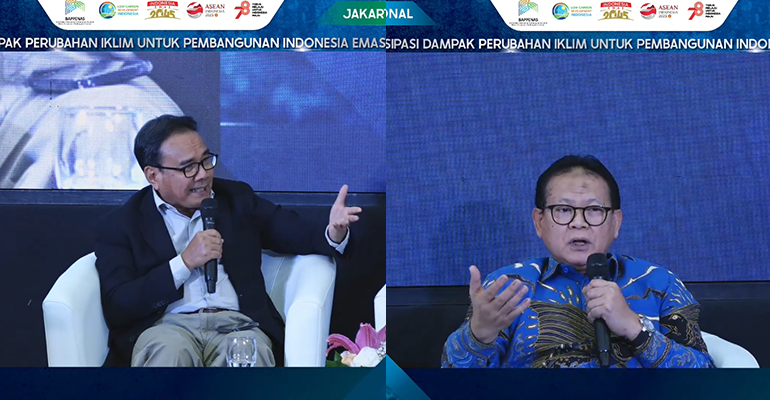Two IPB University Professors Attend Bappenas National Dialogue, Provide Climate Change Mitigation Recommendations

Two IPB University Professors attended a national dialogue on “Anticipate the Impact of Climate Change for the Development of Golden Indonesia 2045,” 21/8. The two Professors of IPB University are Prof Rokhmin Dahuri, Professor of the Faculty of Fisheries and Marine Sciences of IPB University and Prof Daniel Murdiyarso, Professor of Geophysics and Meteorology of IPB University and Researcher of the Center for International Forestry Research (CIFOR). Both provide opinions and recommendations on the impact of climate change.
Both of them think that climate change needs to be taken seriously in order to achieve Indonesia Gold 2045 and Net FOLU Sink. According to him, blue carbon and the use of peatland and mangrove ecosystems can be the answer to mitigate change climate.
Prof Rokhmin Dahuri explained that as a tropical country, the ability to tolerate temperature is very important. When the temperature rises high, then the sea air also increases, so the various types of fish in the sea have a high chance of death. This is because most of the islands in Indonesia are small, so it is important to protect Indonesia’s seas and fisheries.
“The focus of handling is to reduce the sources of climate change and reduce carbon production. Serious efforts are needed in terms of climate change adaptation. The solution, we reduce CO2, by activating blue carbon,” he said.
Prof Rokhmin explained, according to him, the planned development of two million hectares of coastal and marine land to be used as microalgae farms is appropriate for producing biofuels that are more sea-friendly.
“Micro agroculture, in addition to inhibiting global warming, also produces highly compatible biofuels. In terms of adaptation, there is physical biology and socio-economic, from a biology point of view it is
Five species of milkfish and shrimp were found which are resistant to increasing temperatures,” he continued.
Meanwhile, Prof Daniel revealed that peatland and mangrove ecosystems have great potential to mitigate climate change. “Mangroves have three times more carbon storage capacity than other forest types. The number and area of peatlands in the world are also three times larger than the statistical data we previously knew,” he said.
The IPB University expert continued, the potential of the two ecosystems can store up to 55 billion tons of carbon for peatlands and 3.14 billion tons of carbon for mangroves. This value is in accordance with the target of the Paris agreement before 2050.
“In other words, Indonesia does not contribute to producing such large emissions, then the world’s problems will end here, but we also have a development agenda that concerns opportunity costs,” he added. (MW/ra) (IAAS/Res)



